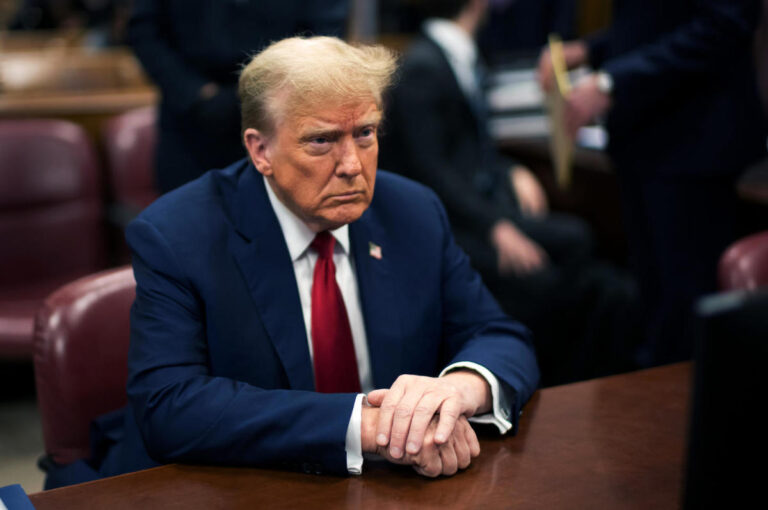On opening night of the Republican National Convention in 2016, Donald Trump came out on stage like a professional wrestler, amid clouds of a smoke machine and dramatic shadows.
It was the kind of image he likes to project of himself: grand and imposing, like the floating head of the Great and Powerful Oz ordering Dorothy to bring him the Wicked Witch’s broom.
But eight years later, the real Trump was revealed to the world in a Lower Manhattan courtroom. Whether he sat in the courtroom or outside, amid poor fluorescent lighting, he looked small, diminished and quite the opposite of a president.
And just as the Wizard of Oz desperately tried to distract Dorothy and her friends when it was revealed, Trump and his lawyers are working to keep the public from looking at the man behind the curtain.
“We will call him ‘President Trump’ out of respect for the office he held from 2017 to 2021,” said his lawyer Todd Blanche. said during opening statements this week. “And as everyone knows, that’s the position he’s running for right now.”
Trump’s lawyers can use whatever title they want, but there is nothing presidential about what is happening in this courtroom. Make no mistake, Trump’s current situation defines him. The fact that he spent every day in court at the courthouse is the physical representation that Trump is not special. He is neither above reproach nor above the law. His fate, like that of all other defendants in a jury trial, is in the hands of his fellow citizens.
This affair also weakened Trump. Focusing on his actions during the 2016 election, prosecutors portrayed him as a small man, desperate to protect his reputation, colluding with tabloid editors to defame his opponents and paying off anyone who might share the truth about him.
The ex-president’s longtime friend, former National Enquirer publisher David Pecker, has already emerged as a star witness in the trial. During his court testimony, Pecker detailed the steps he took to fabricate truly fake news against Trump’s political opponents and “catch and kill” damaging allegations against Trump during the 2016 election.
The details are truly breathtaking. I lived and worked during the 2016 presidential election, and even learned new things from reading Pecker’s testimony.
I had to read it because, to the detriment of American voters, there are no cameras or microphones to allow them to see and hear the testimony from inside the courtroom. So the public relies on exceptional journalists sitting inside to chart the unfolding revelations. This image is far more damning than the allegations that Trump cheated on his wife by having a one-night stand with an adult film actor. (Trump has denied the affair and pleaded not guilty in the matter.)
In opening statements, the Manhattan District Attorney’s Office argued that the case was actually about “outright voter fraud.” The prosecution then described the case to the jury as an orchestrated criminal scheme to corrupt the 2016 presidential election by paying people to remain silent about stories that could damage the reputation of one of the two main candidates.
Nor is this the only case revolving around Trump’s shameful approach to democratic elections.
In the federal election interference case against Trump, special counsel Jack Smith also accused Trump of defrauding the country he once led. And in the Fulton County, Georgia, election interference case against Trump and his co-defendants, District Attorney Fani Willis described the sprawling RICO case as a conspiracy to steal the 2020 election. (Trump pleaded not guilty in both cases.)
The allegations in these cases illustrate the brazen ways Trump plotted to gain and maintain power. It’s no coincidence, it’s a model he will continue to attempt in his third White House campaign this year.
Trump might try, like the Wizard of Oz, to desperately push buttons and levers, to maintain his failing facade before finally admitting that he was nothing more than a hoax.
For more thought-provoking ideas from Symone Sanders-Townsend, Alicia Menendez, and Michael Steele, watch “The weekend” every Saturday and Sunday at 8 a.m. ET on MSNBC.
This article was originally published on MSNBC.com


